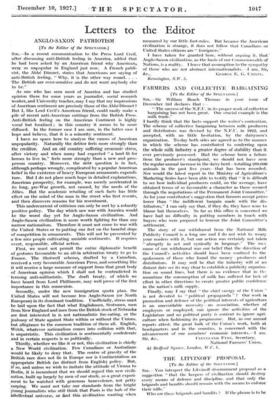Letters to the Editor
ANGLO-SAXON PATRIOTISM [To the Editor of the SPECTATOR.] • • Sin,—In a recent communication to the Press Lord Cecil, after discussing anti-British feeling in America, added. that he had been asked by an American friend why Americans were so unpopular in England just now. A French publi- cist, the Abbe Dimnet, states that Americans are saying of anti-British feeling, "Why, it is the other way round. . . . The British are over-sensitive and do not want anybody else to be."
As one who has seen most of America and has studied opinion there for some years as journalist, social research
Worker, and University teacher, may I say that my impressions
of American sentiment are precisely those of the AbbeDinmet? But I, like Lord Cecil's American friend, could easily make a pile of recent anti-American cuttings from the British Press. Anti-British feeling on the American Continent is highly vocal but localized ; in this country it seems to be more diffused. In the former case I am sure, in the latter case I hope and believe, that it is a minority sentiment.
I have no space here to analyse the causes of American unpopularity. Naturally the debtor feels more strongly than
• the creditor. And an old country suffering economic stress, after victory and when many had expected "a land fit for
heroes to live in," feels more strongly than a new and pros- perous country. Moreover, the debt question is in fact, although perhaps wrongly, complicated by a popular American belief in the existence of heavy European armaments expendi-
ture. But I do not place much hope in detailed explanations. American prosperity, for example, was merely accelerated in
its long, pre-War growth, not caused, by the needs of the Allies. But the academic retailing of such facts has little effect on the mind of the man in the street who first resents, and then discovers reasons for his resentment.
This undercurrent of criticism can only be met by a robustly positive policy. The day which saw war with America would be the worst day yet for Anglo-Saxon civilization. And Anglo-Saxon civilization is more worth fighting for than any narrow nationalism. Therefore it must not come to war with the United States or to putting our feet on the baneful slope of competition in armaments. This will not be prevented by a few nice people cultivating amiable sentiments. It requires overt, responsible, official action.
First, we must not permit the entire diplomatic benefit of gestures favourable to an all-in arbitration treaty to go to France. The Shotwell scheme, drafted by a Canadian, received a very favourable American Press, and something like it will receive a large measure of support from that great body of American opinion which I shall not be contradicted in terming anti-militaristic. The draft treaty, of which we have heard from Lord Phillimore, may well prove of the first importance in this connexion.
Secondly, under the new immigration quota plan, the United States will not become less Anglo-Saxon (or North European) in its dominant tradition. Unofficially, stress must
be laid upon the fact that what Englishmen, Scotsmen, men from New England and men from the British stock of Nebraska
are first interested in is not nationalistic fire-eating, or the jealousy of State against State within or without the Unions, but allegiance to the common tradition of them all. English, Welsh, whatever nationalism comes into collision with that, is unpatriotic. This civilization is sentimentally confederate and in certain respects is so politically.
Thirdly, whether we like it or not, this civilization is chiefly a New World civilization. Few Canadians or Australians would be likely to deny that. The centre of gravity of the British race does not lie in Europe nor is Continentalism an appropriate British (as distinct from English) policy. But, if so, and unless we wish to imitate the attitude of Vienna to Berlin, it is incumbent that we should regard this new civili- zation, built up largely by men of our stock, as a great experi- ment to be watched with generous benevolence, not petty carping. We must not take our standards from the bright Yount; journalists who still think that Paris is the hub of the ilitelleetual universe, or find this civilization wanting when measured by our little foot-rules. But because the American civilization is strange, it does not follow that Canadians or United States citizens are" foreigners."
. I have taken for . granted here, without arguing it, that Anglo-Saxon civilization, as the basis of our Commonwealth of Nations, is a reality. I leave that assumption to the sympathy of those who are not abstract internationalists.--I am, Sir, GEORGE E. G. CATLIN. .Kensington, S.W. 5.










































 Previous page
Previous page